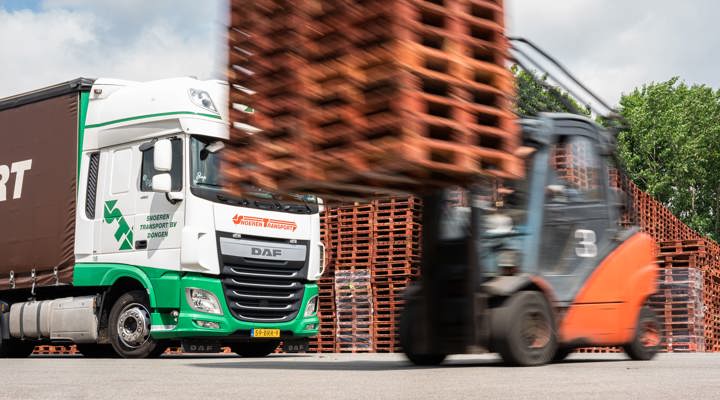09 May 2025
Pallet handling and storage is vitally important to pallet poolers and their customers. Pallets are designed and constructed to transport goods of all values and contribute to economic transportation. To prolong the lifespan of your pallets, they must be handled and stored correctly.
As pallet pool experts, we know how important it is to incorporate these tips and advice into your everyday use of pallet handling and storage, whether that be as part of a pooling network or a pallet-based supply chain.
In this article, we will provide our top tips for handling pallets and storing them. Our tips and guidance are the ones we deem most important to giving your pallets the longest life. Please read on the find out our tips.
Pallet inspection and maintenance
Pallet inspections and maintenance of your pallets are important in pallet handling to ensure the pallet can hold your load safely and correctly. The pallet user is responsible for pallet specification,
ownership, return, replenishment and maintenance. Below are our three main tips for pallet inspection and maintenance
Regularly inspect pallets
Make sure to check over the pallets for any cracks, damage, splinters or nails that may weaken the pallet's structural integrity.
Rotate pallets
Moving your pallets around by implementing a rotational system will make sure that no pallets are sitting untouched for an extended period, which can help minimise rot or damage.
Reinforce pallets
There are plenty of things you can do to reinforce a pallet to make it resistant to damage. You can reinforce pallets with straps, guards, or other methods to ensure they are suitable for your load.
Pallet handling
The way you handle your pallets can have a huge effect on their general wear and tear. If handled correctly, it can help to minimise the amount of maintenance you have to do.
Load Pallets Properly
Proper pallet handling is essential to ensure safety and protect your products throughout the supply chain. When handling pallets, always load and lift them correctly. Distribute weight evenly and place heavier items at the bottom to maintain stability. When lifting, keep your back straight and use your legs to reduce the risk of injury and promote safe, efficient operations.
Use Appropriate Safety Equipment
Many injuries are caused by workers dropping pallets and injuring either their hands or feet. Protective gloves and footwear will help ensure the safety of your hands and feet.
Move Pallets Safely
Moving pallets safely is important for both preserving the pallet and minimisng injury. Avoid dragging or pushing pallets, especially on rough surfaces.
Stack Pallets Safely
Safe pallet stacking is essential to prevent accidents and product damage throughout the supply chain. Always follow established pallet stacking guidelines, adhere to recommended weight limits, and avoid overloading. Proper pallet stacking practices not only improve warehouse safety but also help maintain pallet quality and performance across all IPP pooling operations.
Pallet storage best practices
Below are our best practice tips when it comes to pallet storage.
Designate a storage area
Identify a specific area for pallet storage and maintain it in a clean and organised manner.
Store pallets off the ground
If possible, elevate the pallets using pallet racks or blocks to prevent contact with the ground. This helps to avoid moisture absorption and reduces the risk of pest infestation.
Heat and ventilation considerations
Ensure pallets are stored in an area with good airflow to prevent moisture buildup. Keep pallets away from heat sources and chemicals, as this protects pallets from potential damage or deterioration from these factors.
Other considerations
As well as the main tips and considerations around handling, storage and maintenance, there are other considerations we believe are important. These are listed below.
Training
Proper training is imperative for staff involved in pallet loading. Ensure that they grasp the importance of efficiency, safety protocols, and the correct method of stacking products.
Pallet considerations
Assess your pallet needs and consider the type of pallets that best suit your operation. Invest in pallet racking systems to optimise storage space and improve efficiency or use standard pallet dimensions to simplify storage and handling.
Damaged pallets
Reusing damaged pallets is never safe. Since you shouldn’t be using damaged or broken pallets, avoid placing them in your pallet pool as well. Pallets should be repaired or recycled if they are damaged.
Pallet pooling solutions with IPP
At IPP Pooling, we follow our own top tips when it comes to pallet handling and storage and ensure all the pallets in our pool are maintained to the highest standards. If you would like to use our pallet pool, please contact us.
